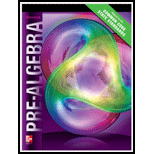
i.
Identify following case whether biased or unbiased: Checking every fifth TV for its quality.
i.
Answer to Problem 13PT
Checking every fifth TV coming out of assembly line for its quality is an example of systematic unbiased sample.
Explanation of Solution
Given:
Every fifth TV coming out of assembly line is checked for its quality.
Calculations:
Here, we have to justify whether given example is biased or unbiased.
Biased samples are the samples that are most likely to be considered than others in whole population.
Unbiased samples are the samples in which almost all members are included in the population
Given example is systematic random type unbiased sample in which TV’s are selected as per time intervals.
In systematic sampling, all elements in a population are counted and every n th element is chosen for inspection.
Conclusion:
Therefore, we are able to define whether given sample is biased or unbiased.
ii.
Identify following case whether biased or unbiased: Surveying every tenth person leaving the library after opening new book store.
ii.
Answer to Problem 13PT
Surveying every tenth person leaving the library after opening new book store is systematic unbiased sample.
Explanation of Solution
Given:
Surveying every tenth person leaving the library after opening new book store.
Calculations:
Here, we have to justify whether given example is biased or unbiased.
Biased samples are the samples that are most likely to be considered than others in whole population.
Unbiased samples are the samples in which almost all members are included in the population
Given example is also a systematic random type unbiased sample where peoples are surveyed as per time interval.
In systematic sampling, all elements in a population are counted and every nth element is chosen for inspection.
Conclusion:
Therefore, we are able to define whether given sample is biased or unbiased.
Chapter 13 Solutions
Pre-Algebra Student Edition
Additional Math Textbook Solutions
University Calculus: Early Transcendentals (4th Edition)
Calculus for Business, Economics, Life Sciences, and Social Sciences (14th Edition)
Calculus: Early Transcendentals (2nd Edition)
A Problem Solving Approach To Mathematics For Elementary School Teachers (13th Edition)
Elementary Statistics: Picturing the World (7th Edition)
- InThe Northern Lights are bright flashes of colored light between 50 and 200 miles above Earth. Suppose a flash occurs 150 miles above Earth. What is the measure of arc BD, the portion of Earth from which the flash is visible? (Earth’s radius is approximately 4000 miles.)arrow_forwarde). n! (n - 1)!arrow_forwardSuppose you flip a fair two-sided coin four times and record the result. a). List the sample space of this experiment. That is, list all possible outcomes that could occur when flipping a fair two-sided coin four total times. Assume the two sides of the coin are Heads (H) and Tails (T).arrow_forward
- e). n! (n - 1)!arrow_forwardEvaluate the following expression and show your work to support your calculations. a). 6! b). 4! 3!0! 7! c). 5!2! d). 5!2! e). n! (n - 1)!arrow_forwardAmy and Samiha have a hat that contains two playing cards, one ace and one king. They are playing a game where they randomly pick a card out of the hat four times, with replacement. Amy thinks that the probability of getting exactly two aces in four picks is equal to the probability of not getting exactly two aces in four picks. Samiha disagrees. She thinks that the probability of not getting exactly two aces is greater. The sample space of possible outcomes is listed below. A represents an ace, and K represents a king. Who is correct?arrow_forward
- Consider the exponential function f(x) = 12x. Complete the sentences about the key features of the graph. The domain is all real numbers. The range is y> 0. The equation of the asymptote is y = 0 The y-intercept is 1arrow_forwardThe graph shows Alex's distance from home after biking for x hours. What is the average rate of change from -1 to 1 for the function? 4-2 о A. -2 О B. 2 О C. 1 O D. -1 ty 6 4 2 2 0 X 2 4arrow_forwardWrite 7. √49 using rational exponents. ○ A. 57 47 B. 7 O C. 47 ○ D. 74arrow_forward
 Algebra and Trigonometry (6th Edition)AlgebraISBN:9780134463216Author:Robert F. BlitzerPublisher:PEARSON
Algebra and Trigonometry (6th Edition)AlgebraISBN:9780134463216Author:Robert F. BlitzerPublisher:PEARSON Contemporary Abstract AlgebraAlgebraISBN:9781305657960Author:Joseph GallianPublisher:Cengage Learning
Contemporary Abstract AlgebraAlgebraISBN:9781305657960Author:Joseph GallianPublisher:Cengage Learning Linear Algebra: A Modern IntroductionAlgebraISBN:9781285463247Author:David PoolePublisher:Cengage Learning
Linear Algebra: A Modern IntroductionAlgebraISBN:9781285463247Author:David PoolePublisher:Cengage Learning Algebra And Trigonometry (11th Edition)AlgebraISBN:9780135163078Author:Michael SullivanPublisher:PEARSON
Algebra And Trigonometry (11th Edition)AlgebraISBN:9780135163078Author:Michael SullivanPublisher:PEARSON Introduction to Linear Algebra, Fifth EditionAlgebraISBN:9780980232776Author:Gilbert StrangPublisher:Wellesley-Cambridge Press
Introduction to Linear Algebra, Fifth EditionAlgebraISBN:9780980232776Author:Gilbert StrangPublisher:Wellesley-Cambridge Press College Algebra (Collegiate Math)AlgebraISBN:9780077836344Author:Julie Miller, Donna GerkenPublisher:McGraw-Hill Education
College Algebra (Collegiate Math)AlgebraISBN:9780077836344Author:Julie Miller, Donna GerkenPublisher:McGraw-Hill Education





